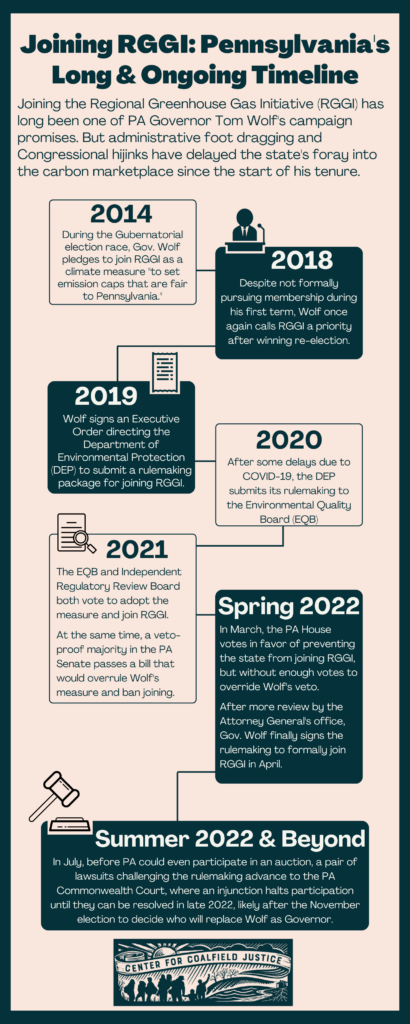
As of July 1, 2022, Pennsylvania became the 12th state to join the Regional Greenhouse Gas Initiative (RGGI), a cap-and-trade program that requires coal-fired power plants to buy an allowance for every ton of carbon dioxide they emit. The allowances are sold at quarterly auctions, and the revenue generated is distributed to the states in proportion to the number of allowances they put up for auction. Every year the cap, or the amount of allowances sold, decreases so that carbon dioxide emissions also decrease over time.1While the goal is to decrease emissions yearly, there are some mechanisms within the RGGI program that prevent the decreases from actually happening. For example, power companies can buy allowances and not use them until later years when they can buy less allowances. In Pennsylvania, Governor Wolf has proposed that auction proceeds be used to invest in our communities and workers, lower our emissions, and deploy renewable energy technologies.
However, while Pennsylvania is a RGGI state, we are not yet an active participant. This is because two court cases are pending before the Commonwealth Court. These cases will determine whether we can stay a part of the program. One case has been brought by Republican legislators claiming that the regulation that made Pennsylvania a RGGI state was published too early, and the other case was brought by coal and labor groups that claim RGGI is against the law entirely. Injunctions have been imposed in both cases that prevent the state from participating in quarterly auctions until the cases have been resolved.2However, one of the petitioners in the coal and labor group case was required to post a $100 million bond for the injunction in that case to take affect. As of September 15, 2022, they are unable to post that bond meaning that the injunction in that case could soon be lifted. Arguments are scheduled for September and November.
While Pennsylvania is not an active participant, RGGI auctions continue for the 11 other states in the program. The latest auction, Auction 57, was held on September 7, 2022. Over 22 million allowances were auctioned off at $13.45 each, generating $301.3 million to be distributed among the states for reinvestment. Before we were prevented from participating in the auction, Pennsylvania committed an additional 15.9 million allowances (about 71% of the total allowances offered). At the rate allowances were sold in September, Pennsylvania would have seen over a $215 million investment from RGGI in this quarter alone.
Another auction is scheduled for December, but Pennsylvania is unlikely to participate in that one, either, unless the injunctions from the court challenges are lifted by October 23.3The Pennsylvania Department of Environmental Protection stated that if the injunctions “remain in place through October 23, 2022, then the Commonwealth will be unable to timely provide the required notice of its participation in the December 7, 2022 quarterly RGGI emissions allowance auction, and will be unable to participate in that auction.” in a filing with the Pennsylvania Supreme Court dated August 24, 2022. This is unlikely since arguments in one of the cases are not scheduled until after the deadline, and the injunctions likely won’t be lifted until the cases are decided. And as the December auction will likely generate just as much revenue as this one did, Pennsylvania will be missing out on another significant investment.
RGGI requires power companies to pay for the pollution they cause. The program will generate billions of dollars over the next several years that could be used to invest in Pennsylvania’s communities, worker transition opportunities, and clean energy future. Environmental Justice communities would see targeted investments for air and water quality improvements, for recreation opportunities and general economic development, and for increased public participation. Pennsylvania would have already seen hundreds of millions of dollars in investments without interference. The fate of RGGI and its future investment opportunities are now in the hands of the Commonwealth Court. Still, the Center for Coalfield Justice will continue to work to ensure that future RGGI proceeds will be invested transparently and equitably in communities most impacted by air pollution.
- 1While the goal is to decrease emissions yearly, there are some mechanisms within the RGGI program that prevent the decreases from actually happening. For example, power companies can buy allowances and not use them until later years when they can buy less allowances.
- 2However, one of the petitioners in the coal and labor group case was required to post a $100 million bond for the injunction in that case to take affect. As of September 15, 2022, they are unable to post that bond meaning that the injunction in that case could soon be lifted.
- 3The Pennsylvania Department of Environmental Protection stated that if the injunctions “remain in place through October 23, 2022, then the Commonwealth will be unable to timely provide the required notice of its participation in the December 7, 2022 quarterly RGGI emissions allowance auction, and will be unable to participate in that auction.” in a filing with the Pennsylvania Supreme Court dated August 24, 2022.
